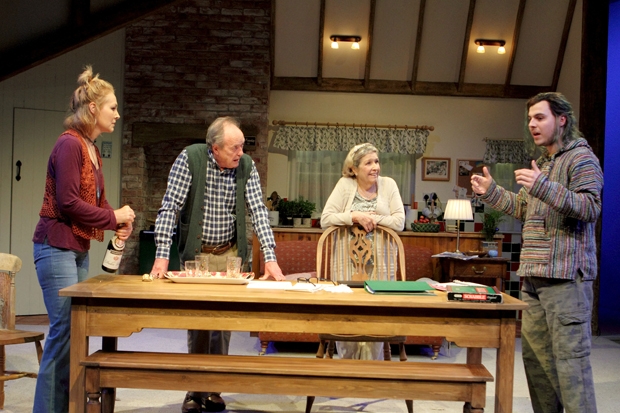Fracking is a British tradition. Since 1969 more than 200 sites have used hydraulic fracturing ‘without environmental catastrophes’ according to Dick Selley, an emeritus professor of geology, writing in the programme notes to Fracked! by Alistair Beaton. The satire takes the opposite view and regards fracking as a wicked novelty inflicted on rustic innocents by Big Oil, which hopes to steep the country’s aquifers with radioactive water and massacre all its customers at the same time. That’s the business plan, apparently.
We meet a pootling granny (Anne Reid), who reluctantly leads a campaign to stop Deerland Energy from plastering southern England with horrible drilling platforms. Deerland hires a firm of PR monsters to fight Granny’s retinue of high-minded bumblers and the characterisation starts to slither into facile stereotypes. Everyone in the countryside is a cheery dimwit, everyone in London is a public-school back-stabber. Beaton’s dialogue often sounds like the bleatings of a bus-stop numpty. ‘Why is everyone for sale nowadays? Disgusting.’ Oliver Chris stands out in the best role as a Blairite super-smoothie but too many of his excellent colleagues are under-used. Michael Simkins seems half-asleep as a prissy Deerland executive and James Bolam is barely stretched as a potting-shed duffer who gets a few sparse laughs when he takes on a drawling eco-nuisance.
Beaton’s cumbersome stagecraft gives the assistants a busy night as they turn the PR headquarters into Granny’s humble cottage, and back again, about eight times. And Beaton seems oblivious to topical developments. His gets the Deerland top brass to meet the energy secretary in Whitehall but he ignores the revelation, announced the day before press night, that the department has now been dissolved. A hot-topic show needs to respond to events. Failure to update the script leaves the viewer feeling that he’s ahead of the satirist. Which is deadly.
Towards curtain-down the play’s structural problems become apparent as Beaton struggles to find a proper climax. He lays on three different sieges without delivering a pay-off. Granny’s cottage is occupied by randy neighbours, who erect a rutting tent in her back garden. The nearby fracking site is surrounded by Gaia crusties and the PR headquarters in London gets attacked by chanting anarchists throwing eggs and banging bongos. One siege is enough. Three dissipates the energy. The play ends with some troublemakers being arbitrarily rounded up by sinister cops as if to remind us that Big Oil is running Britain as a police state.
This isn’t a satire so much as a hoarse battle cry from an ageing rebel whose student card has morphed into a bus pass without its owner acquiring the collateral benefactions of wisdom or common sense. Who to blame? Not the director, Richard Wilson, whose staging is as crisp and entertaining as the script will allow. The producers placed too much confidence in Beaton’s satirical powers and they overinvested in a cast of 15 actors who have far too little to do. Catch Fracked! while you can. Its days, I fear, are numbered.
How the Other Half Loves is both groundbreaking and reactionary. Ayckbourn’s innovative drama puts two living-rooms in a single space and features a pair of dinner parties that take place simultaneously in stage time but on consecutive evenings in real time. This clever device congratulates the audience on its ability to handle two planes of understanding at once. Highly flattering. The play is reactionary in that it endorses a class system that was already vanishing in the 1960s. For Ayckbourn society is composed of three layers where an individual’s mechanical skill is the ultimate badge of inferiority. Toffs have no understanding of domestic practicalities; the bourgeoisie can just about change a fuse; the toiling masses keep a toolkit handy at all times. This easy-to-read system lends Ayckbourn’s work an air of timelessness that the plays themselves, with their superficial dialogue and sketchy characterisation, don’t entirely merit.
The script opens with posh Fiona trying to conceal her fling with randy Bob, who works for her husband’s firm. Fiona’s attempt to create an alibi leads to endless complications but romance itself is tossed aside: this is a sex farce with no sex. The challenge for the production is to pull off the theatricalities with a sense of grace and effortlessness, and director Alan Strachan achieves this with complete assurance. Great cast too. Nicholas Le Prevost plays absent-minded charm as sweetly as anyone in the business. Jenny Seagrove gives the ultra-chilly Fiona a hint of smouldering lust. And Gillian Wright is hilarious as a simpering halfwit seized with social paranoia. It’s a slow-burn performance that steals up unobtrusively, but by the end Wright has become the dominant figure on stage.







Comments